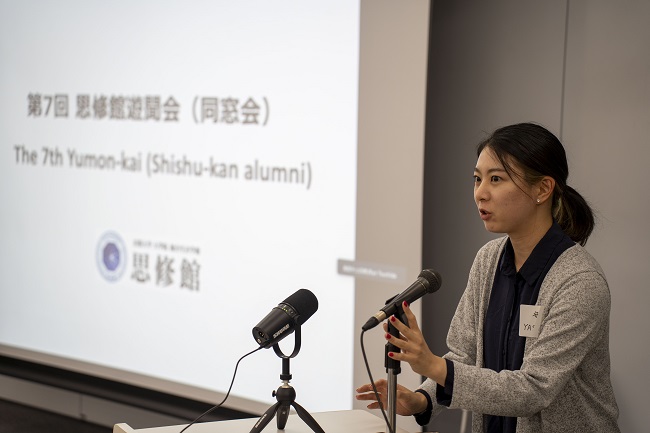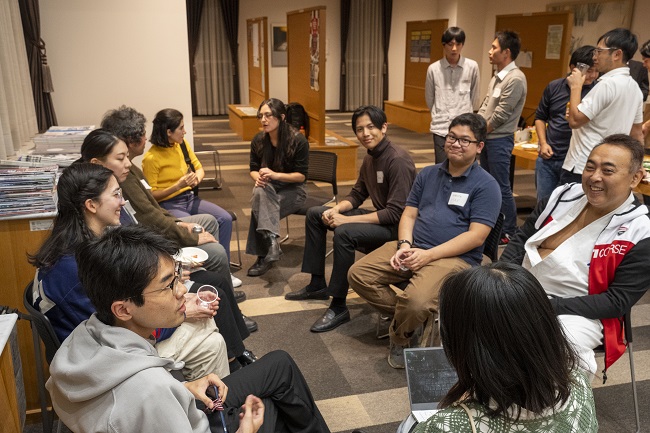Sustainable development is a common desire of people around the world, but the world is full of problems that threaten the daily lives and future of humankind, such as conflicts, economic disparities, climate change, natural disasters, environmental destruction, pandemics, and a declining birthrate and aging population. ing.
Kyoto University's Comprehensive Institute for Survival Studies was established in the spring of 2013 with the aim of producing global leaders who will take on the challenge of solving these social issues related to the survival of humanity. It is a graduate school with a five-year doctoral program, and graduates are awarded a doctorate (general academic degree).There are currently 5 students in the fifth year, and as of this spring, 5 students have completed doctoral courses.Graduates are expected to be leaders in social change and are active in international organizations, universities, research institutes, government offices, companies, NGOs, etc.
The school is expected to begin accepting applications for the winter entrance exam for XNUMX admissions soon.Additionally, although the details have not been made public, a new salary scholarship system will be offered to students starting next year.Below, we will take a look back at the unique initiatives undertaken by the Kyoto University Graduate School of Comprehensive Survival Studies.

From the XNUMXth Alumni Reunion held at Higashi Ichijo Building, Kyoto University recently.
Tailor-made instructional system that responds to students' wide range of research fields
The school's greatest feature is its ``tailor-made'' curriculum design tailored to each individual student in order to meet the needs of students who aim to solve social issues from a wide range of research fields in the sciences and arts.To this end, we have adopted a ``multiple supervisor system'' in which multiple faculty members provide interdisciplinary guidance to each student's research.In addition to full-time faculty members affiliated with the university, faculty members from other graduate schools and research institutes also cooperate with students from a wide variety of academic backgrounds and specialized research fields.
At the "Learning Commons" located in the Higashiichijo Building, where classrooms and research laboratories are located, students from diverse backgrounds sit at desks with students from different fields and interact, learning and researching while sharing each other's knowledge.In addition, in the ``Complex Research Group'' led by faculty members, students work together through joint research and research presentations.
Each grade has a variety of projects to foster the desire to solve social issues.
XNUMXst and XNUMXnd year"Service Learning"Through practical learning in local communities, we aim to understand various positions and viewpoints, as well as cultural and social customs, and develop a mindset suitable for leaders who have a sense of norms, sociability, a heart of consideration for others, and the ability to take action. This project will be carried out with the cooperation of outside institutions, such as welfare facilities in the Kyoto city area.
``Deliberation'' is a seminar-style class that involves in-depth discussions with top leaders who are active in various sectors of society.This course aims to develop and deepen problem awareness regarding various issues in the real world.We invite leaders from various fields who have been active for many years in various fields such as international organizations, government agencies, companies, and NGOs to serve as specially appointed instructors.
In the third to fifth years, in order to acquire knowledge and experience that can be practically used in the field where social issues are occurring,"Musha training"(Internships that foster practical skills and internationalism)This curriculum aims to determine one's own position from a global perspective and to develop comprehensive skills, social skills, and leadership that can be used internationally.The dispatch destinations are spread all over the world, including international organizations such as the United Nations, IEA, OECD, and World Bank, companies, and NGOs.Each student searches for an institution of their choice based on their own interests, and negotiates for acceptance with the support of their academic advisor and institution.Supervisors not only assist in selecting a destination and negotiating acceptance, but also keep in touch with students on a daily basis through email and online meetings during their assignment, and conduct on-site visits as necessary.Students are encouraged to obtain funding for their dispatch on their own, but if this is not possible, the university will also subsidize the cost.
After the warrior training, as the culmination of five years of research and practical education, students plan and implement a project to connect their research results to social implementation, involving people from other institutions.PBR (Project Based Research)There is.
The purpose is to acquire planning, execution, negotiation, and communication skills to integrate various knowledge and experiences to solve problems.In implementing the program, students will work with their peers to handle budgets, procurement of personnel, coordination with related parties, legal and managerial tasks, etc.The necessary funds are subsidized to a certain extent by the university, but there are also many cases in which students themselves obtain the necessary funds by soliciting sponsors from various organizations and general companies. The results of PBR will be incorporated into the doctoral thesis because it is extremely important for the university, which places emphasis on social implementation.
In recent years, reforms to undergraduate and graduate school education have been accelerating at Japanese universities, but it is important to note that these efforts have been underway for more than 10 years.

As the school enters its 10th year this year, it plans to carry out further reforms.Specifically, the selection method and curriculum will be partially changed starting from the 2025 entrance exam.In addition, the university plans to provide generous financial support for talented students to attend school by providing a monthly salary scholarship of approximately 10 yen.
For young people who want to work in international or government organizations, become experts who are responsible for a sustainable society, become active doctoral degrees, or become researchers aiming for interdisciplinary research, "Would you like to follow in his footsteps and aim to make a difference in society and the world?" the school urges.

